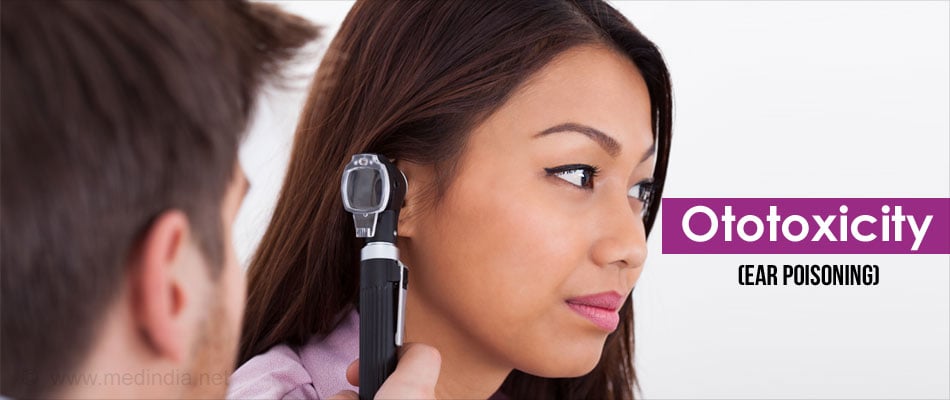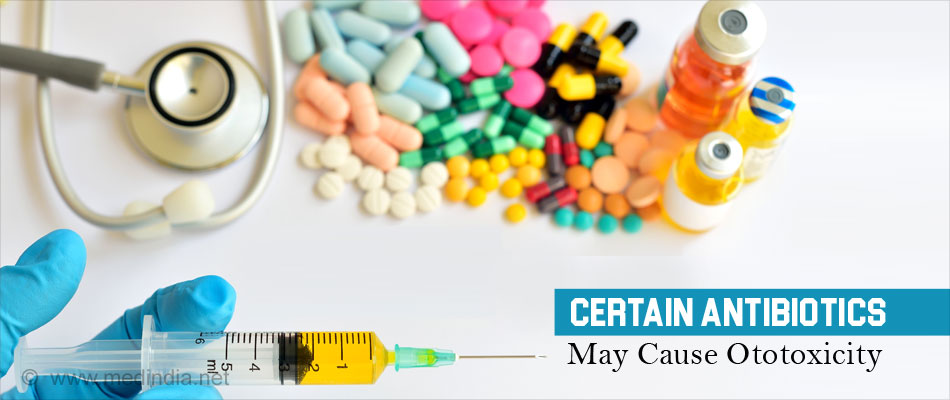- Ototoxicity - (https://en.wikipedia.org/wiki/ototoxicity)
- What is Ototoxicity? - (http://vestibular.org/ototoxicity)
- Ototoxic Medication - (http://www.asha.org/public/hearing/ototoxic-medications/)
- Ototoxicity - Ear Poisoning - (http://kidshealth.org/en/parents/ototoxicity.html#)
What is Ototoxicity?
Ototoxicity of a substance means that the substance is toxic or poisonous to the ear. The toxic effects occur in specific parts of the inner ear like the cochlea which is involved in hearing, the vestibular system which is responsible for balance, and /or the vestibulo-cochlear nerve which carries signals from the ear to the brain.
Ototoxicity therefore results in sensorineural hearing loss, tinnitus or balance disorders. The effects of ototoxicity can be temporary or permanent. The hearing loss can be unilateral hearing loss (hearing loss in one ear) or bilateral hearing loss (hearing loss in both ears).
Antibiotics such as gentamicin, chemotherapy agents such as cisplatin, diuretics like Furosemide and some of the nonsteroidal anti-inflammatory drugs are known to be ototoxic. Exposure to certain environmental and occupational chemicals has also been known to cause hearing loss due to ototoxicity.

What are the Causes of Ototoxicity?
Some chemicals, over-the-counter drugs, prescription medications and chemotherapy agents are known to cause ototoxicity. Some of the causes of ototoxicity are as given below.
Loop Diuretics:
Chemotherapy Agents:
- Cisplatin
- Cyclophosphamide
- Bleomycin
- Carboplatin
- Vinca Alkaloids like Vincristine
Antibiotics:
- Aminoglycosides: Gentamicin, Tobramycin, Streptomycin, Neomycin, Kanamycin, Amikacin
- Macrolide Antibiotics: Erythromycin

Nonsteroidal anti-inflammatory Drugs:
Antimalarial Medication:
Erectile Dysfunction Medications:
Antiseptics and Disinfectants:
- Topical ointments such as chlorhexidine and ethyl alcohol can damage the inner ear if they go past the middle ear. This can happen with those who have undergone any kind of surgery of the middle ear.
Environmental and Industrial Chemicals
- Carbon monoxide – Exposure to carbon monoxide at the work place can cause mild-to-moderate hearing loss
- Arsenic – Exposure to arsenic occurs in factories manufacturing parasite and micro-organism inhibitors. It damages the cochlea
- Mercury – Exposure to mercury occurs in soldering occupations and manufacturing of thermometers and detonators. The cochlea is damaged
- Manganese – Exposure to manganese occurs in people working with manufacturing battery, electroplating and processing of iron
- Lead causes demyelination of vestibulocochlear nerve. Hearing loss and vertigo occur

- Trimethyltin is used to stabilize heat for polyvinyl chloride piping, siding and window castings and industries manufacturing marine paint, wood preservative, polyurethane foam and fungicides. They are also used in poultries
- Carbon disulfide is used in the manufacture of insecticides and solvents
- Trichloroethylene is used as a solvent in manufacturing cleaning agents, pesticides, adhesives, lubricants and waxes. Exposure to trichloroethylene causes damage to the cochlea
- Styrene is used in factories that produce plastics, resins, insulating materials and synthetic rubber
- Xylene is present in paints, varnishes and thinners
- Toluene is used in the production of lacquers and paints. It is also used in making rubber and adhesives. It is an ingredient in rotogravure printing, leather tanning and spray paints.
Factors Affecting Ototoxicity of a Drug
- Dosage of the drug / amount of exposure to chemical
- Duration of the treatment / exposure
- Rate of infusion of an intravenous medication
- Combination of drugs given. The chances of suffering from ear damage are higher if two ototoxic drugs are given together
- Genetic predisposition to ear damage
What are the Symptoms and Signs of Ototoxicity?
The main symptoms of ototoxicity are hearing loss, vertigo and tinnitus. The symptoms of ototoxicity depend on the part of the ear that is damaged.
Cochleotoxicity results in symptoms of mild tinnitus to profound hearing loss. It can be one-sided or both-sided. Symptoms include:
- Ringing sound in the ears
- Difficulty in understanding speech in noisy surroundings
- Profound hearing loss
Damage to the vestibular system can result in imbalance and inability to walk straight. When one side is affected, symptoms include:
- Giddiness
- Headache
- Unsteady gait
- Vertigo
- Eye jerks or nystagmus
- Inability to maintain balance to the extent of total incapacitation
- Nausea and vomiting

When both the sides of the vestibular system are affected, the symptoms are more severe and include:
- Headache and fatigue
- Vomiting
- Nystagmus
- Feeling of fullness in the ears
- Oscillopsia – a feeling of bouncing of vision and vision blurring
- Total imbalance, affecting the ability to walk
- Wide-based gait – walking by keeping legs wide apart in an attempt to prevent falling sideways
- Difficulty in walking in the dark
If the vestibulocochlear nerve is affected, the communication between the inner ear and the brain is lost.
How do you Diagnose Ototoxicity?
There are no particular tests to confirm if the problems of giddiness, tinnitus and hearing loss are caused specifically by ototoxic agents. Diagnosis is based on:
- History of intake or exposure to ototoxic substances
- Symptoms like headache, giddiness and tinnitus
- Hearing and /or balance problems as noted on physical examination
- Responses to a balance questionnaire
- Tests such as:
- Electronystagmogram
- Otoacoustic emissions test
- Posturography
- Auditory brainstem response audiometry

How do you Treat Ototoxicity?
There is no treatment to reverse the effects of ototoxicity. Sometimes, the ear may heal spontaneously when the treatment with the ototoxic drugs is completed or the drug or chemical exposure is stopped early. Symptoms may be managed with certain measures:
- Correction of hearing can be done with the help of an amplification device like a hearing aid or the insertion of a cochlear implant
- Physical training to manage balance issues. The patient is taught to use clues from vision and body position to maintain balance while walking
How do you Prevent Ototoxicity?
- Check for alternates for ototoxic drugs with your doctor.
- Monitor your hearing and balance systems with regular checkup and follow-ups during exposure to ototoxic medications. Report to your doctor if you notice the relevant symptoms.
- Discuss with your doctor about any drug side effects that you have had earlier, specifically those that have caused ringing in your ears.

Preventing occupational ototoxicity:
- Remove hazardous substances from work place.
- Protect yourself from inhalation, ingestion or skin contact with hazardous chemicals.
- Work in well-ventilated conditions, if chemicals cannot be avoided.
- Monitor hearing ability and tinnitus on a regular basis.
Health Tips
- Avoid direct exposure to agents known to be ototoxic.
- Cover your skin and other exposed areas when working with chemicals that cause ototoxicity.
- Wear a mask to be safe from inhaling chemicals like arsenic that are used in paints.
- Get your hearing and balance systems regularly checked by a doctor.









